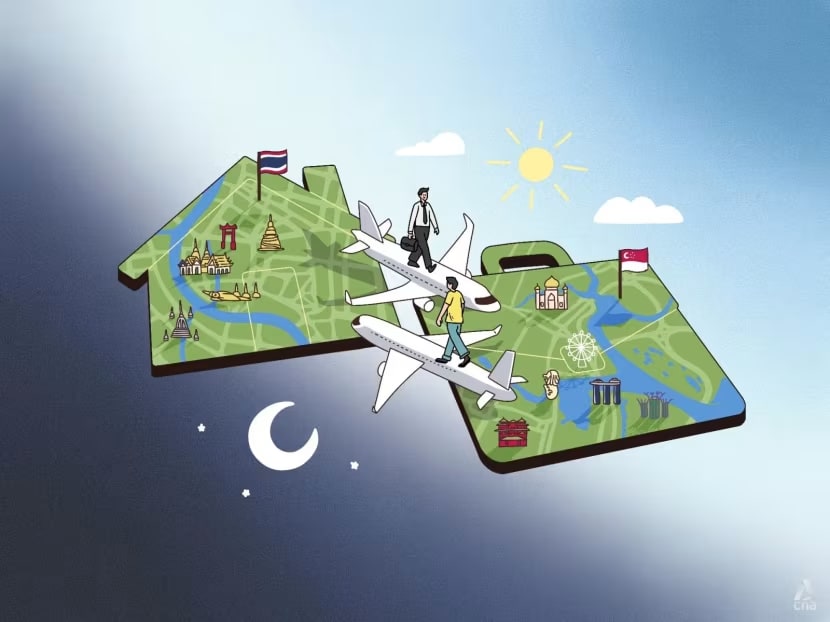How these Singaporeans are chasing their dreams and cutting costs by 'super commuting' between cities
These supercommuters say that the main benefit of their lifestyle is the fact that they get to earn a paycheck in Singapore while spending on the much more affordable costs of living in a neighbouring country.

Many super commuters earn income in strong currencies like the Singapore dollar while enjoying more affordable housing, food, and space in their host countries. (Illustration: CNA/Nurjannah Suhaimi)

This audio is generated by an AI tool.
Mr Rayson Koh, 29, rents an apartment in Bangkok where he lives, but every month the Singaporean flies back to the Republic to attend work meetings as a financial adviser, splitting his time between the two cities.
It had always been Mr Koh’s dream to live overseas. So in January 2024, he packed his things and moved to Thailand, using the Thai language skills that he picked up during his university days to his advantage.
“My job as a financial adviser gives me a lot of flexibility. Since we are self-employed, we’re actually allowed to plan our schedule. With that, I decided to come to Thailand a lot more,” he said.
He added that much of his job can be done online, such as processing claims for his Singaporean clients. He returns to Singapore only to attend courses and meet his clients in person when they want to purchase new products.
Mr Koh is an example of a “super commuter” – an individual, often middle-class, who resides in one city but travels a long distance, often by air, to another for work.
While there are no official statistics about the number of Singaporean super commuters, 2024 research from Stanford University indicated that the share of super commuting workers in 10 US cities has increased by a third since the start of the pandemic.
Many become super commuters to cut expenses. They are not necessarily wealthy business travellers and are more often trying to take advantage of the better salaries paid in one country – Singapore, for example – and the more affordable housing and other expenses in another.
or instance, Mr Koh pays S$1,000 (US$785) a month for a loft in Bangkok. He said that he would have to fork out six times that amount if he were to do the same in a comparable location in Singapore.
Overall, he estimated that he has cut his living expenses by 20 per cent by living in Thailand, even after factoring in the cost of commuting.
Individuals like him do this for a variety of reasons, according to career development coach Samantha Ng from Abundanz Consulting.
She said that they might be at a stage of life where, financially, it makes sense for them to adopt a lifestyle that gives them more time to prioritise what is important to them, whether it is a slower pace of life or the ability to explore a new country.
“There is also a possibility that individuals make such a choice out of necessity, because living in Singapore is a lot more expensive than commuting,” she added.
Looking at the bigger picture, veteran economist Song Seng Wun said that transport connectivity has improved tremendously over the years, so he believes that the super commuting trend is likely to continue.
Living abroad also benefits Singaporean business owners keen on creating wealth from a growing Asean region.
“The power of the Singapore brand name is very important, whether it’s in the medical space, education or just providing a service. So it always attracts that trust,” said Mr Song, who is an economic adviser at CGS International Securities Singapore.





